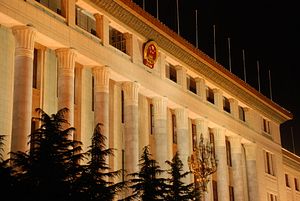Throughout the period before, during and after this month’s Third Plenum of China’s Communist Party’s Central committee, observers have swung from almost ecstatic optimism, through hopeful caution, into overblown pessimism and now back to hopeful, cautious anticipation. It still seems very early to be passing judgement on the communiqué and statements released since the meeting wrapped. Meanwhile though, two more high-profile cases have emerged that once again highlight a serious issue that China must tackle, especially if it hopes to smoothly implement any complicated new economic or social policies.
Just one day before the Third Plenum began in Beijing, the New York Times published a piece accusing rival Bloomberg of quashing a story that was deemed politically sensitive in China. Apparently the revelation was leaked by reporters who had been working on the Bloomberg article themselves. The story was reported to focus on
“…a Chinese billionaire entrepreneur who had financial ties to relatives of current and former members of the Standing Committee of the ruling Politburo, the top political body in China”
The Financial Times, one of Bloomberg’s other main rivals, reported on the incident on the November 11, adding that people “familiar with the story” had revealed that it dealt with Wang Jianlin, the founder of Dalian Wanda and probably China’s richest man. (The Bloomberg reporter who is believed to have leaked the quashing of the story has apparently been suspended.)
Even before the Bloomberg “self-censorship” story had fully broken (denied by Michael Bloomberg himself), the New York Times (which, perhaps significantly, is already blocked in China and thus has very little to lose from upsetting powerful people there) published yet another bombshell claiming that JP Morgan had questionably hired a consultancy firm run by a “Lily Chang,” who the paper claimed is in fact Wen Ruchun, daughter of former Chinese Premier Wen Jiabao.
China’s censors then spent a few days furiously removing any tweets on Weibo (China’s Twitter clone) which referred to Lily Chang or asked who she really is.
Following separate articles last year by both Bloomberg and the New York Times (which led to both of their websites being blocked in mainland China) about the wealth of various family members of current president Xi and then Prime Minister Wen respectively, Bloomberg was the only one left with “skin in the game” as its revenue-generating financial news services and terminals still operate and sell in China.
Even if publishers of stories that question the activities of China’s leaders and their families are not the only foreign news publications under pressure in China, Pacific Money does not have any particular insight or comment on the veracity of recent spate of news stories mentioned above. There is however something to say with regard to the roll-out of reforms from the Third Plenum and the related, wider issue of transparency.
Without better transparency, China is going to be hard pushed to partially reform S.O.E. ownership (you have to value them and their operations accurately first and work out who actually owns them). Equally it may be hard to implement fair changes to the hukou system or rural land rights processes (including ways for farmers to sell their land to bigger farms or urban areas), or tackle the unsustainable economic structure (perhaps partly by rating local officials’ performance more by how much debt they generate, or maybe pollution).
The private sector, which is set to play a greater role in the economy as certain monopolies are reformed, also relies more heavily on transparency and good practices for smooth operation.
It appears that local governments will be looking increasingly at tax revenue as a source of funds (as opposed to land sales, or debt issuance), but tax collection is very hard when earnings, payments, income and assets are hidden or obfuscated on a wide scale.
In theory, true transparency, along with a supporting regulatory and judicial system, drastically reduces any opportunities for the corruption which can hinder or prevent the effective implementation of all sorts of policies which China seems to be on the cusp of rolling out. Whether it be corporate accounting, or personal asset calculation, greater transparency might prove (either during the process or later on in hindsight) to be an extremely important factor affecting the upcoming changes in China.
Like the reforms gradually becoming clearer after the Third Plenum, greater transparency is probably going to have to be imposed from the top. Let’s hope that there will be moves in this direction soon.

































